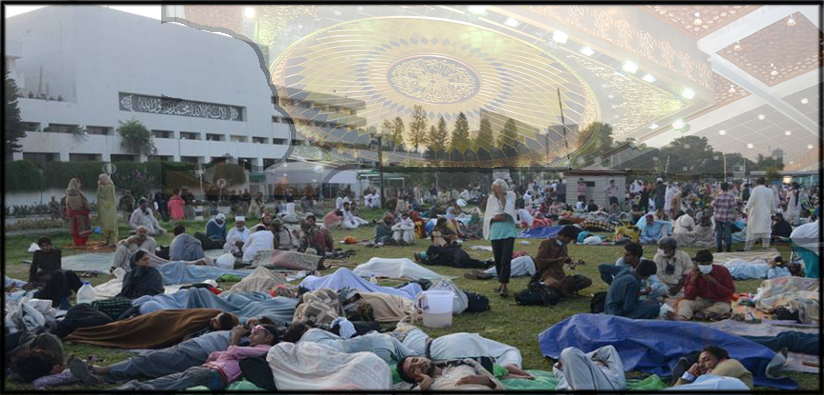Parliamentarians’ Questionable Debates
The joint session of the parliament (Senate and National Assembly) which started on September 2, 2014 and will continue for a week, will debate the prevailing political crisis in the country. Traditionally, the joint session of the bicameral house is held on significant issues, for specific purpose.
The parliamentarians from both sides of the government and opposition benches lend strong and unambiguous stand for democracy and re-pledge their faithfulness to the Constitution. The overall focus is to guard themselves in wake of Pakistan Awami Tehreek and Pakistan Tehreek-e-Insaf long marches and sit-in protests in front of the parliament.
However, the joint session of the parliament is altering the aspect and concurrence of the circumstances briskly. Many of the points raised in the session are inconsiderate and non-democratic in nature. Instead of showing apprehension regarding the root cause of the ongoing protests, Federal Minister for Interior Chaudhry Nisar has labeled the sit-in as ‘mutiny’ in his speech,
‘It is a mutiny against Pakistan”
Similarly, our representatives in the house termed the protesters as terrorists and gypsies. In the eyes of parliamentarians, it is not a protest but an act of terrorism. These sorts of speeches by members of the parliament have undeniably exposed the mentality and priorities set by them for their people.
In my opinion, it is the perfect time for the politicians of Pakistan to understand that it is not a mutiny against Pakistan but a disturbance against the sleeping politicians who are not willing to work for the welfare of common people. In fact, it is just a glimpse of what the whole of the nation is going through because of bad governance.
According to a World Bank report, Pakistan’s more than sixty percent population is living below the poverty line. The 21 percent of the population lives below $1.25 (less than Rs 200) per day income. The lifestyle maintained by poverty-stricken section of society is somewhat similar to the lifestyle of so called ‘gypsies’ (protesters in front of parliament). The Poor population in Pakistan is deprived of safe drinking water, poor sanitation facilities, and shelters just like people in the garden of parliament.
Moreover, the education, employment and health sectors are like prohibited areas for poor population of the country.
Democracy means to be ‘rule by the people’. It is the form of government ‘of the people, by the people, for the people’. In Pakistan, parliamentarians have totally forgotten that they are voted and appointed by poor people (gypsies) as their representatives in the parliament to solve their problems and not to show extreme dislike towards the down-trodden population in the name of democracy and sacred building.
Another very alarming aspect of this joint session is the excessive criticism on Pak armed forces by members of parliament. Major accusations include conspiracy against the system and democracy, as well as the soft corner for the marchers by stopping government to use force against them.
The whole nation is an eyewitness that government itself dragged the institution in the pure political turmoil by asking them to facilitate. Javed Hashmi openly accused army for writing a script of both protests. Interestingly, he categorically said ‘I have no evidence’. ISPR press releases rejected the assertions that army or ISI is backing PTI/PAT in current political upheaval. So, now there is no significant reason to pinpoint army in parliament.
However, the parliamentarians are still in the mood of frenzy, they are labelling army as protester friendly. They are unable to understand the behavior of protesters towards the army, as one of the parliamentarian sarcastically asked the house the philosophy behind,
“Shoot at the police and say ‘zindabad’ to the army“.
The root cause behind the shoot at the police and say ‘zindabad’ to the army is quite simple, the typical mindset of the political elite has politicized and demoralized police. Due to this custom, police has endured a failure in credibility and self-esteem. The practice of using police-force for personal and political interests developed a distrust and abhorrence towards law enforcement people.
Another parliamentarian has asked,
‘If the army goes to them, they listen. What kind of a message are they giving?’
Somebody tell the honorable member that by listening to army, demonstrators are delivering a significant message that an institution or a department should work according to rule and regulation without the interruption of politics and the safety of people should be its first priority.
On the other hand, it is very upsetting to see that none of the members showed any patriotism and courage to defend army in the house. No one praised the role of army to stay neutral in such political power crisis. None of the parliamentarians admired Zarb-e-Azb operation or paid any tribute to soldiers martyred during the military offensive in North Waziristan.
In my opinion, it should be matter of concern for the peoples’ democratic representatives to recognize real causes behind the turmoil rather than blaming institutions. The need of the hour is to understand the philosophy of ‘performance based democracy’. It is impossible to safeguard the democratic system if there is absolutely no welfare for the common people. So far, the parliament has only one responsibility that to pass piles of resolutions in favour or against the problems and nothing else.
The leadership should consider the democratic principles and try to solve the ills and tribulations of the populace. The parliament needs to play a superior role rather than the constant worry to demonstrate strength and a win-over situation to Imran Khan (PTI) and Dr. Tahir ul Qadri (PAT).
The parliament should come forward and determine its real position and remind the nation why ‘Pakistan’s Parliament’ is so revered and imperative – it is the place where the will of people is sacrosanct.
The people of Pakistan expect progression and maturity, humbleness and commitment as well as the execution of so many vows and assurances by the parliamentarians on the floor of supreme house.

